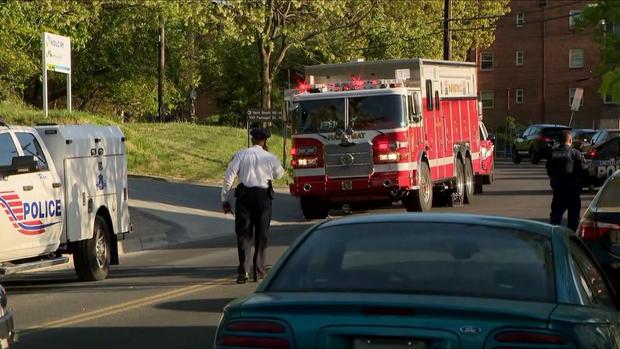World War I-era munitions found in D.C. park — and the Army says there may be more
A section of Fort Totten Park in Washington, D.C. will remain closed while the National Park Service and U.S. Army continue to investigate World War I-era munitions that were found there, officials said Thursday.
The metal projectiles were originally discovered in April and now the Army has determined that other munitions may be hidden in the park, the National Park Service said in a statement, although officials did not disclose what led them to that conclusion.
Two metal canisters were found on April 18 during unauthorized work conducted by an adjacent property owner who pushed about 10 feet of soil onto Fort Totten Park, officials said. One munition was a 75-mm projectile, about 11 inches long, and the other was a 19-inch-long Livens projector — a mortar-like weapon that could launch gas bombs.
Nearby subway trains bypassed the Fort Totten stop for more than an hour after the munitions were found, CBS affiliate WUSA-TV reported.
Army experts determined the 75-mm projectile contained only soil and did not pose a hazard, but the Livens projector was filled 85% with an unknown liquid.
Initial testing of the liquid in the Livens projectile was inconclusive, so it was taken to Aberdeen Proving Ground in Maryland for additional testing, officials said. Ultimately it was determined that the liquid was 99.9994% water and 0.0006% a commercial chemical called acetophenone, officials said. Acetophenone is a non-hazardous chemical used in the perfume industry as fragrance in soaps and perfumes, as a flavoring agent in foods, and as a solvent for plastics and resins.
A U.S. Army Corps of Engineers spokesperson told WTOP the two canisters were similar to weapons found in a cleanup at the former American University Experiment Station — a site that was once dubbed the "mother of all toxic dumps."
CBS affiliate WUSA-TV reported that the munitions were found about two years after officials found an empty, unfused WWI-era metal canister in Fort Totten Park.
Local advisory neighborhood commissioner Zach Ammerman told WUSA-TV in May that the discoveries were "concerning and alarming."
Delegate Eleanor Holmes Norton wrote a letter to National Park Service Director Charles Sams calling for an investigation into ordinances, soil and groundwater contamination throughout the park, the station reported.
"I believe it is imperative that NPS conduct an investigation throughout Fort Totten Park," she said. "This park is located in a residential neighborhood and is regularly used."




